-
President 2012: Jon Huntsman Ad Portrays Mitt Romney as a Flip Flopper – And So Do Others
Weather Vane by the Jon Huntsman CampaignNot really a shocker is it?
If not from the right, then the left will get into the action.
This theme will be played over and over next summer, if Mitt Romney is the GOP nominee.
Is there any wonder, why Mitt has not closed the deal?
-
President 2012: Jon Huntsman Promises a Chicken in Every Pot
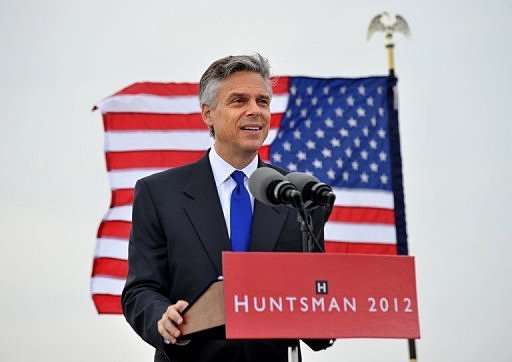
In desperation to save a failing campaign, Jon Huntsman goes back to the tried and true of pandering – the tax code.Former Utah Gov. Jon Huntsman (R) will propose sweeping tax reforms Wednesday in a speech outlining his plans on job creation.
Huntsman will lay out his plans for tax and regulatory reform, energy independence and free trade in a New Hampshire speech that’s being billed as perhaps the last best chance for Huntsman, who stands far behind the GOP frontrunners in polls, to establish himself as a serious contender for the Republican presidential nomination.
“Meeting our challenges will require serious solutions, but above all, it will require serious leadership – a quality in high demand in our nation’s capital, and among my opponents on the campaign trail,” Huntsman will say, according to excerpts released by his campaign.
The centerpiece of the plan is a proposal to reform tax rates. The Huntsman plan would eliminate all loopholes, deductions and tax exemptions in exchange for establishing three individual income brackets, taxed at eight, 14 and 23 percent. The Huntsman plan would also eliminate capital gains and dividend taxes, do away with the Alternative Minimum Tax (AMT) and reduce the corporate tax rate to 25 percent.
The details of the Huntsman plan are really not important. Nobody believes Huntsman anyway.
Today’s exercise is a last gasp and Huntsman should be packing it in soon. He probably should have stayed in China working as Obama’s Ambassador.
-
President 2012 GOP New Hampshire Poll Watch: Romney 36% Vs. Perry 18% Vs. Paul 14% Vs. Bachmann 10%
According to the latest NH Journal/Magellan Strategies Poll.
In the wake of Texas Gov. Rick Perry’s entrance into the GOP presidential race, former Massachusetts Gov. Mitt Romney holds onto a double-digit lead in New Hampshire, according to a new poll.
Romney, who owns a home in the Granite State, attracts 36 percent support from likely GOP primary voters, according to a NH Journal/Magellan Strategies (R) poll released Wednesday. Perry makes a strong debut in the poll, however, placing second behind Romney with 18 percent support. Fellow Texan Ron Paul rounds out the top three with 14 percent.
Minnesota Rep. Michele Bachmann, whose focus on the early state of Iowa paid off in the form of a straw poll victory in Ames over the weekend, garners 10 percent support. Bachmann’s Iowa victory likely won’t boost her prospects in New Hampshire, however, as 84 percent of likely voters polled say the straw poll results won’t impact their decision in the GOP primary.
A good initial New Hampshire poll for Texas Governor Rick Perry.
Not so good for Michele Bachmann who won last weekend’s Iowa Ames Straw Poll. It seems that Perry who just announced a few days ago is sucking the air out of Bachmann’s conservative base and her campaign.
And, Jon Huntsman. Why is he still in the race?
Former Utah Gov. Jon Huntsman attracts only 3 percent support from voters. The former U.S. ambassador to China has been polling near the bottom of national surveys, but his focus has been on New Hampshire. He visited the state last week, but the Magellan survey shows a plurality of voters in the state — 47 percent — have an unfavorable opinion of him. Twenty percent say they like him while 24 percent say they don’t know enough about him to make a decision.
-
President 2012: Does Jon Huntsman Have No Choice But to Dump John Weaver?
+++++Update+++++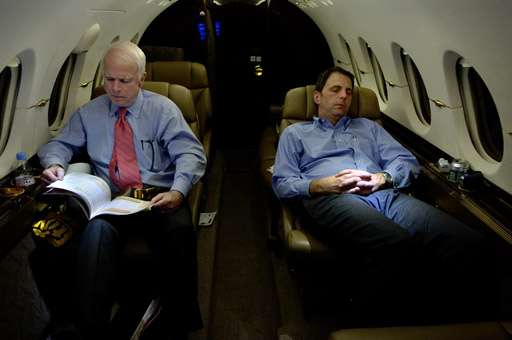
John McCain and John Weaver
This is an updated post from this morning and I ask the question, especially after this piece from Matt Lewis.Jonathan Martin’s terrific piece on the unraveling of Jon Huntsman’s presidential campaign has garnered deserved attention. But one quote — from Huntsman’s long-time confidant David Fischer regarding chief strategist John Weaver — struck me as especially noteworthy.
Fischer said that one of the reasons he was going public with his story was because, “Weaver’s history in past campaigns is when they don’t work out, for whatever reason, he attacks the candidate.”
Put in historical context, Fischer’s worries may not be absurd.
Read it all and then answer the question: Does Jon Huntsman Have No Choice But to Dump John Weaver?
-
President 2012: Turmoil in the Jon Huntsman Campaign Focuses on John Weaver
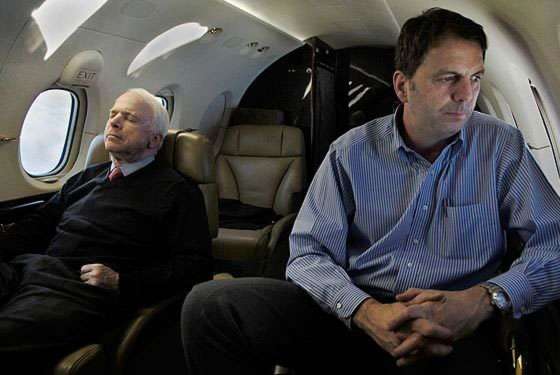 The GOP knives are really out for former Utah Governor Jon Huntsman and his top campaign strategist John Weaver.
The GOP knives are really out for former Utah Governor Jon Huntsman and his top campaign strategist John Weaver.A blistering internal feud in the Jon Huntsman presidential campaign is erupting into public view, with dueling camps trading charges and an exodus of campaign officials.
And now, a longtime family friend tells POLITICO that Huntsman’s wife and father fret that his presidential prospects have been threatened by the turmoil — and he places the blame on John Weaver, Huntsman’s controversial chief strategist.
Huntsman himself is so worried about the “drama,” as he calls it, that he’s taken a hands-on role in the restructuring, in hopes of rebounding from early missteps before it’s too late to improve his bottom-of-the-pack standing.
“I look forward to a future of less drama, more money and increasing contrasts with my opponents. We can win this thing,” Huntsman wrote in an email to the friend just hours after the resignation of his first campaign manager, Susie Wiles, became public July 21.
“Goodness will overcome the temporary difficulties and early turf-protecting within the campaign,” wrote Huntsman, adding: “I love you like a brother.”
The recipient of that email — David Fischer, who has known Huntsman since the 1980s and later worked for his father — shared with POLITICO behind-the-scenes details about Huntsman’s stumbling start.
He described Huntsman’s organization as disorganized and full of staff tension, disclosed new facts about the candidate’s announcement day mishaps, recounted tearful conversations with the recently departed Wiles and revealed other previously undisclosed resignations.
Fischer himself recently left the campaign after being asked to give up his operations post by Weaver, who the campaign said was acting at the behest of the candidate. In a subsequent email — one of several from Huntsman reviewed by POLITICO — Huntsman asked Fischer to stay on in an advisory role.
Fischer attributed the problems in the campaign almost entirely to Weaver and a management style marked by what he and another campaign source described as “verbal abuse.”
“It’s not an ego [thing],” Fischer said, when asked why he was going public. “In fact, a lot of it is if the story gets told, I want the story to be, because Weaver’s history in past campaigns is when they don’t work out, for whatever reason, he attacks the candidate. And in this case, I am hoping that people at least focus on, well, what went wrong here? The strategy went wrong. The strategy didn’t work. At least to this day it hasn’t worked.”
After Fischer’s revelations, multiple sources close to Huntsman’s campaign subsequently came forward to corroborate some of the information and disclose new facts — revealing a campaign divided between factions loyal to Weaver and those who couldn’t stand him.
Weaver declined to answer questions, and the campaign instead issued a statement targeting Fischer.
“Dave Fischer tried to threaten the campaign regarding his participation in this story and we refused to cooperate with him,” said spokesman Tim Miller. “As a volunteer staff member he attempted to usurp authority, asked inappropriate questions about junior staff and was rightly asked to leave by Governor Huntsman. His statements about this campaign are untrue. The fact that he would be willing to undermine Governor Huntsman in this way says everything you need to know about his character, his credibility, and whether he has the Governor’s best interests at heart.”
Read it all.
Huntsman’s campaign NEVER had a chance from the beginning and after this embarrassing revelation would be better to save his time, effort and money and prepare for the next part of his career. This Presidential campaign is a disaster and demonstrates Huntsman’s like of executive expertise.
Put a fork in Huntsman – He’s Done.
-
California, Flap's California Morning Collection, Jerry Brown, John Chiang, Jon Huntsman, Poker, Tobey Maguire
Flap’s California Morning Collection: June 22, 2011
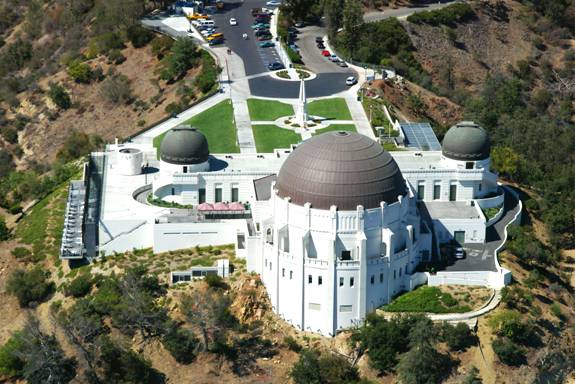 A morning collection of links and comments about my home, California.
A morning collection of links and comments about my home, California.California Controller John Chiang decided yesterday afternoon that he would withhold paychecks from California Legislators since they did not pass a “balanced” budget by the deadline as specified by Proposition 25. Now, remember they did pass a budget which was quickly vetoed by Democrat Governor Jerry Brown. This budget was not “balanced” enough for the California Controller.
Oh well – back to the drawing board.
However, this is not stopping these same Legislators from soliciting campaign cash this week.
Monday, Republican Sen. Bill Emmerson was looking to bulk up his campaign chest for re-election next year.
Tuesday saw nine legislators making the restaurant rounds from Spataro to Chops to Esquire Grill and beyond: Democratic Assemblymen Marty Block, Das Williams and V. Manuel Pérez, and Sen. Curren Price; plus Republican Assembly members Dan Logue, Katcho Achadjian, Chris Norby and Diane Harkey, and Sen. Sam Blakeslee.
Today, these lawmakers continue the quest: Democratic Assemblymen Ben Hueso, Sandré Swanson and Henry T. Perea and Sen. Noreen Evans; plus Republican Assemblymen Brian Jones and Don Wagner, and Sens. Doug LaMalfa and Mark Wyland.
Who ever said these POLS would be starving with or without balancing the California budget?
On to this morning’s California links.
Tobey Maguire Sued Over Multi-Million Dollar Illegal Poker Game; DiCaprio, Affleck & Damon Involved
Spider-Man star Tobey Maguire is among more than a dozen high-profile Hollywood celebrities being sued in connection with a mega-millions illegal gambling ring that ran high-stakes underground poker games, Star magazine is reporting exclusively.
Maguire, 35, won more than $300,000 from a Beverly Hills hedge fund manager who embezzled investor funds and orchestrated a Ponzi scheme in a desperate bid to pay off his monster debt to the star and others, it’s alleged.
An FBI investigation into Brad Ruderman, the CEO of Ruderman Capital Partners, uncovered how he lost $25 million of investor money in clandestine poker games held on a twice weekly basis in suites at the luxury Beverly Hills hotel, Four Seasons, and the Viper Room on Sunset Boulevard.

Brown Plots New Budget as California Lawmakers Forfeit Pay for Being Late
California Governor Jerry Brown has drafted a plan to pass a budget through the Legislature that sidesteps Republicans who blocked a previous effort, according to two people with knowledge of the matter.
Brown’s proposal comes as legislators have been forced to forfeit pay for every day they fail to send a balanced budget to the governor past a June 15 deadline. He vetoed a spending plan sent to him by Democrats last week, saying it used legally doubtful maneuvers and one-time fixes.
“I’ll be sharing some very specific ideas tomorrow,” Brown said to reporters as he left a meeting with Assembly Democrats yesterday. “There will be several ideas I’ll propose.”
Timm Herdt: Brown can’t get 4 votes; how can he get 81?
Legislators, Democrats and Republicans alike, know all that and they simply won’t swallow the bitter medicine that the grown-up Brown says is the only alternative if he doesn’t get the chance to ask voters to weigh in on extending current tax rates.
From the legislators’ perspective, when compared to their other choices, the idea of muddling through for another year without solving the state’s chronic fiscal problems doesn’t seem like such a terrible option.
Thus far, Brown hasn’t wavered from the plan he put forth in January. But the new fiscal year begins a week from Friday.
“The next step is the governor’s,” Senate President Pro Tem Darrell Steinberg, D-Sacramento, said Monday. “If he wants to suggest a budget with significantly deeper cuts to education, health care and public safety, we’ll take a look at it.”
If Brown is forced to take that step, know this: It won’t be nearly as popular as his veto.
Huntsman to hold California fundraisers
Jon Huntsman, fresh off his campaign launch, will host three high dollar California fundraisers next week.
The former Utah governor will be in San Diego on June 26th, and Orange County and Los Angeles on June 27th. Dinner with Huntsman will cost donors $1,000, while a VIP cocktail reception will cost the primary election maximum of $2,500. Huntsman is also soliciting high dollar bundlers to raise money on his behalf and offering them perks like a seat at the head table and extra VIP tickets for high dollar commitments.
Enjoy your morning!
-
President 2012 GOP Poll Watch: No Major Shake Up In GOP Field After New Hampshire Debate
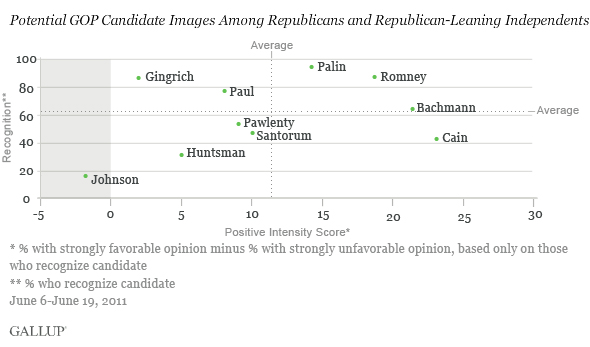
According to the latest Gallup Poll.Gallup Daily tracking finds no major shake-up in the GOP presidential candidates’ ratings among Republicans nationwide in the two weeks surrounding a New Hampshire debate that featured seven of the candidates. Mitt Romney, Sarah Palin, and Michele Bachmann continue to enjoy the best overall positioning by virtue of having higher name recognition and Positive Intensity Scores than their potential rivals. By comparison, Jon Huntsman, who formally announced his candidacy Tuesday, is recognized by 34% of Republicans and enters the race with the third-lowest Positive Intensity Score of any candidate measured.
By my read of the graph, it is Romney, Cain, Palin and Bachmann who are in the hunt. The others not so much, especially Tim Pawlenty and Jon Huntsman, who announced today.
Additionally, Bachmann’s intensity score edged up slightly (from +18 to +22) and Cain’s declined slightly (from +28 to +23). Given the sample sizes of Republicans familiar with each candidate (smaller than those familiar with Gingrich), these changes are not statistically significant; however, if they hold for another week, they would represent real shifts after the debate.
More generally, among those with the highest Positive Intensity Scores, Cain is performing better than he did earlier this year, Romney has recovered somewhat from a decline in his ratings in late April and May, and Bachmann is on par with her earlier ratings, while Palin is near her low point for the year.
Here is a graph of positive intensity scores:
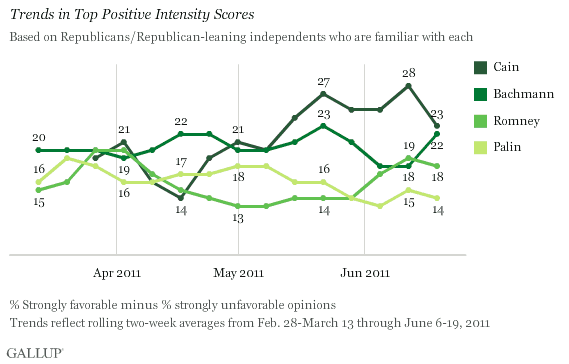
So, what does this all mean?
As, I have been saying for a few weeks: Mitt Romney is the clear front-runner with Michele Bachmann in position to make a race of it. Some pundits have been almost praying for Rick Perry or Jon Huntsman to challenge Romney. But, I just do not see it.
Romney has been campaigning for President now for over 6 years, has the campaign and personal money to air many ads and while a mainstream candidate will do extremely well in the early primary states of New Hampshire and Nevada.
Michele Bachmann of the Tea Party will do well in her native Iowa and conservative South Carolina. Whether she can beat Romney in Florida or on Super Tuesday is unknown.
Again, I don’t think Sarah Palin will run and she has made no movement lately to change that opinion. Herman Cain is not well known enough, will compete in Iowa and then go away.
So, unless someone else comes in this week it is really a Romney vs. Bachmann race.
Romney, Palin, and Bachmann continue to fare best among Republicans nationwide by simultaneously being among the best-known names in the potential presidential field as well as generating positive reactions from those familiar with them. This nexus of recognition and popularity will be essential to each candidate’s success in the primary elections next year.
Romney, Palin, Gingrich, and Paul all face the difficult challenge of improving their images among Republicans who mostly know them and have already formed opinions about them.
Johnson, Huntsman, and, to a lesser extent, Rick Santorum, Cain, and Pawlenty, all have an arguably more difficult task in needing to expand their name recognition among Republicans at a time when major national press opportunities, such as debates, are still fairly infrequent. Also, because of their lower profiles, these candidates may find that the campaign funds for buying national TV time are hard to come by, a conundrum faced by most second-tier candidates.
Additionally, Gingrich, Pawlenty, and Palin have all experienced declines in popularity at the same time that Romney, Bachmann, and Cain are mostly holding steady.
-
President 2012 Poll Watch: 22% Won’t Vote for a Mormon Presidential Candidate
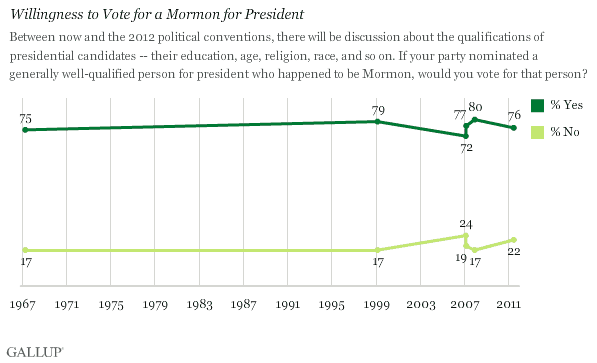 According to the latest Gallup Poll.
According to the latest Gallup Poll.Though the vast majority of Americans say they would vote for their party’s nominee for president in 2012 if that person happens to be a Mormon, 22% say they would not, a figure largely unchanged since 1967.
The question is mainly relevant to the Republican and independent vote in 2012, given that the current Republican front-runner, Mitt Romney, is an active member of the Church of Jesus Christ of Latter-day Saints, commonly known as the Mormon church, and that another Mormon, former Utah Gov. and former Ambassador to China Jon Huntsman, may enter the race for the GOP nomination as early as next week.
The new Gallup poll, conducted June 9-12, finds nearly 20% of Republicans and independents saying they would not support a Mormon for president. That is slightly lower than the 27% of Democrats saying the same.
What are the demographics of this political bias?
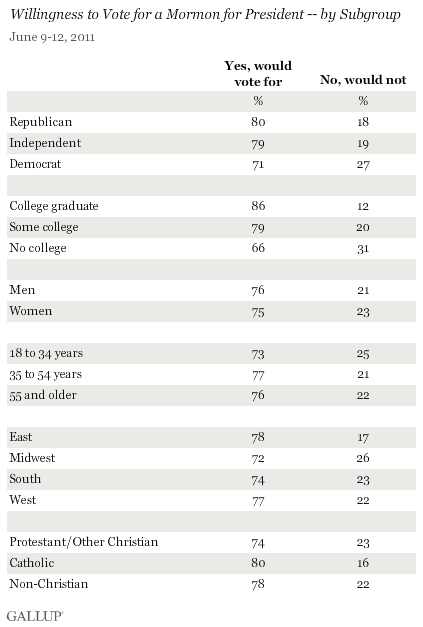 So, it is mainly educational level – with the less educated saying they would not be willing to vote for a Mormon.
So, it is mainly educational level – with the less educated saying they would not be willing to vote for a Mormon.And, what about other voting preference bias?
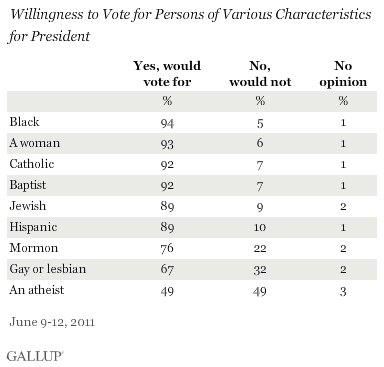
Only gay/lesbian and an athiest President would be less preferred than a Mormon.
The stability in U.S. bias against voting for a Mormon presidential candidate contrasts markedly with steep declines in similar views toward several other groups over the past half-century, including blacks, women, Catholics, and Jews. The last time as many as 22% of Americans said they would not vote for any of these groups (the same level opposed to voting for a Mormon today) was 1959 for Catholics, 1961 for Jews, 1971 for blacks, and 1975 for women. As noted, opposition to voting for each of these has since tapered off to single digits.
Still, it is significant that in 1959, the year before John F. Kennedy won election as the nation’s first Catholic president, 25% of Americans — including 22% of Democrats, 33% of Republicans, and 18% of independents — said they would not vote for a Catholic. Public opposition fell to 21% by May 1960 and to 13% by August 1961.
So, what does this all mean?
Republican Presidential candidates Mitt Romney and Jon Huntsman who are both Mormon face additional obstacles to the GOP Presidential nomination because of religious bias against their candidaacies. But, like President John Kennedy will either of them be able to persuade voters that their biases are unwarranted?
Perhaps.
In the early primary states of Iowa and South Carolina, there are very active Evangelical Christians who hold the Mormon or Latter Day Saint’s Church with disdain. Many of these voters will NOT be voting for either Romney or Huntsman. In a very divided early primary GOP field this would likely mean a loss, delivering momentum to other candidates. Will this be enough to derail Romney who is way ahead in the early state of New Hampshire?
I guess we will see?
And, it really depends upon who enters the GOP primary field and how many survive to campaign in Florida and the Super Tuesday states.
Americans’ reluctance to support a Mormon for president has held close to the 20% level since Gallup first measured this in 1967, and long after historical biases against voting for blacks, Catholics, Jews, and women have dwindled.
Currently, 18% of Republicans say they would not vote for their party’s nominee if that person happened to be Mormon. This may be less troubling for Romney in the GOP primaries, where the vote could be highly fractured anyway, than in the general election, where — should he win the Republican nomination — he would need nearly complete support from Republicans to be competitive with President Obama. However, Kennedy’s success in overcoming a similar challenge in 1960 relating to his Catholic faith may give hope to Romney and his supporters about his electability in 2012.
-
President 2012 Video: First Anti-Jon Huntsman Web Video Appears
-
President 2012: Jon Huntsman to Adopt Florida GOP Nomination Strategy?
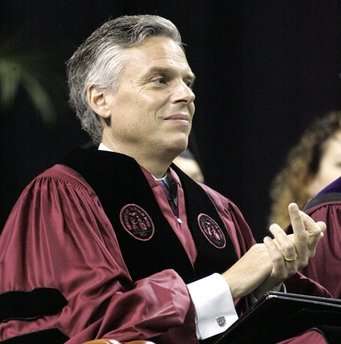
Former U.S. Ambassador to China and former Utah Gov. Jon Huntsman applauds at the commencement ceremony at the University of South Carolina on Saturday, May 7 2011 in Columbia, S.C.
Huntsman will be basing his campaign in Orlando, Florida and this is the speculation.Former Utah Governor Jon Huntsman will base his presidential campaign in Orlando, Florida, if he enters the race, an aide to Huntsman confirmed to CBS News.
The Huntsman campaign-in-waiting sees Florida as a key state in deciding the Republican presidential nominee – it’s where John McCain effectively won the nomination in 2008 – as well as in the general election, where it is expected to be a key swing state. In addition, the GOP nominating convention will be held in Tampa.
Huntsman’s wife Mary Kaye Huntsman grew up in Orlando, and the aide noted that she still has family and friends in the area.
Some are saying that the socially moderate Republican Huntsman cannot compete in socially conservative Iowa and South Carolina. Moreover, Huntsman may very well concede Nevada and New Hampshire (to a lesser degree) because of the strength of fellow Mormon Mitt Romney. Hence the same strategy that was disastrous for Rudy Giuliani in 2008.
Planting a flag like that in Florida will inevitably bring comparisons (first!) to Rudy Giuliani’s late strategy, which was more an adjustment to early state weakness than a grand plan, and which didn’t work. Whatever groundwork one can lay thinly across a huge place like Florida is in danger of being washed away by the wave coming out of Iowa, New Hampshire, and South Carolina.
But Huntsman’s stand there (and he’s also playing aggressively in New Hampshire and South Carolina) seems to anticipate the same unusual campaign that Romney is planning for, one that’s more about weakness than strength, in which Romney limps out of the early states wounded but breathing, and facing a rival who simply can’t keep up with his spending through the long march of the first half of 2008. Huntsman may also be able to spend a lot, if not Romney money, and seems also the bracing for a long march.
What is different this time is that Huntsman, unlike Giuliani, is planning 2012 as his first or a trial run for the Presidency. If lightening strikes and he wins the nomination (probably due to some blow up of Romney, Daniels and Pawlenty) great, if not plan for the future run. Florida is an important state, one in which television media will be in play. Florida will be just as important in 2016 and beyond as it is today.
And, who knows, if Huntsman does well enough, he could be picked as a Vice President candidate.
It is all about the future with Jon Huntsman.